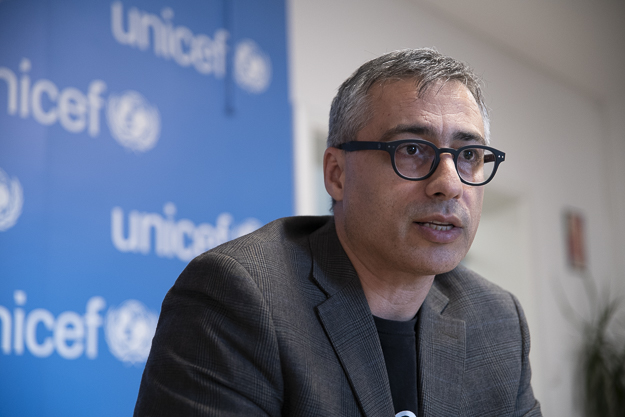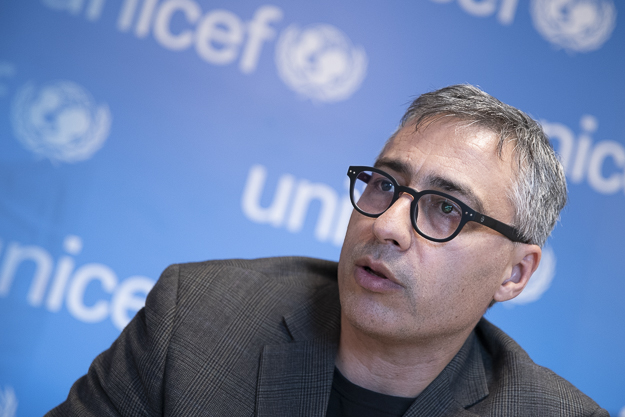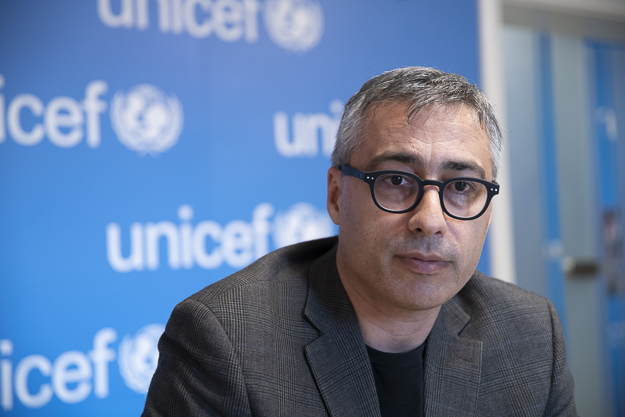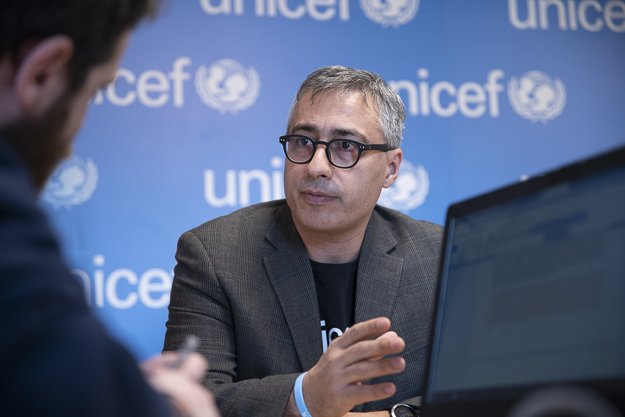In 1954, the United Nations issued the Declaration of the Rights of the Child, which called on countries to protect children and their welfare. In 1989, the General Assembly of the United Nations approved the Convention on the Rights of the Child. On November 20 we mark World Children’s Day. This convention has been ratified by more countries than any other in United Nations history.
The convention calls for children to enjoy their right to life, to health, to education, as well as opportunities to play. Protecting children from violence and discrimination is one of the principles on which the convention is built. Despite countries pledging to respect the principles of the convention, millions of children around the world continue to have their rights denied.
In Kosovo, many children are faced with these problems, such as a lack of education and access to healthcare, as well as poverty and child labor.
Poverty remains as one of the key issues that face children.
Although we have seen some improvements in recent years, there are problems with children’s access to education, dropouts and unequal education opportunities. In particular, there are big problems with access to pre-school education.
Roma, Ashkali and Egyptian communities are especially affected by the lack of opportunity and access. Only 20 percent of children from these communities manage to finish high school.
Moreover, children with disabilities also face problems with education. The lack of suitable infrastructure, adequate personnel and other issues hamper educational opportunities for disabled children.
Discrimination, exploitation and violence also affect children in Kosovo.
K2.0 spoke to Murat Sahin, Head of the United Nations Children’s Fund (UNICEF) office in Kosovo. On World Children’s Day, UNICEF published a report with findings about the condition of children in Kosovo and the issues they face.

Photo: Atdhe Mulla / K2.0.
In your opinion, what is the situation with Kosovo’s children?
Maybe I can connect it with my childhood. I come from Turkey and I am now 45 years old. If you look at my mother and father, I come from a normal family and my father was a government official and my mother was a primary school graduate. So in my family the only dream was to have a child become an engineer or doctor. So there was a vision for me from my childhood.
The dream of my father and mother was translated into a vision so that they did their best to ensure that I got the best education I could. I studied engineering, did my MBA and I have been with UNICEF for 20 years. I am now head of the UNICEF office in Kosovo.
One out of five living in poverty means that the family does not have the means to give the best for the child.
If you look at families here, it is similar for their child. Everyone wants the best for their child. The best health, the best education. The average Kosovar mother and father want to see their children get married, have their children and become grandparents.
So when I look at rights in Kosovo it is not like Yemen or Syria. You know that children are being born in a conducive family environment. The bigger challenges are the institutions of Kosovo and 10 years or 20 years of building institutions is too short a time.
You know that the institutions are not the best quality, the health system is not there. If you open a company it takes years to establish a trust with the customers, to have returning customers and to ensure quality. To ensure quality you need continuous learning to understand what the customer wants, what the society wants.
Even a private sector company takes years — as they say in business — to have a return on investment. You open a bank or a shop or a restaurant, you do a huge capital investment and it takes maybe five years for you to reach a break-even point. Even after five years, only maybe do you start making profit.
So for Kosovo, the institutions on health, education and social welfare are all becoming established. When you are becoming established you are trying to learn from successful countries. This is where UNICEF plays a critical role in bringing what works in different parts of the world and adapts these ideas to the Kosovo context.
As I was saying five years or 10 years is too short to have an amazing institution with 100% customer satisfaction. When I look at children they want quality education, quality health and quality participation. These are the dreams of children not only in Kosovo but also in America and in the 140 countries where UNICEF works.

Photo: Atdhe Mulla / K2.0.
We have quite a lot of poverty in Kosovo. Your report notes that poverty levels are key to child development.
One out of five children live in poverty. There was a survey on Kosovo young people asking what would be a good enough salary for you to stay in Kosovo? Young people responded by saying 600 euros a month would make it okay for me to stay in my country.
But if you’re a family with two kids, parents working, how much do you really need so you can keep your child in a nursery? So you can go to work and buy the books so that the children are empowered? One out of five living in poverty means that the family does not have the means to give the best for the child. That’s where the state or social institutions come into play.
According to you, what are the institutions doing to fix that? Do we have a plan to fight poverty?
Institutions are working. Yes, I think the big agenda is covered by the Sustainable Development Goals [SDGs] and the UN Development Framework aiming to eliminate poverty globally. It is not so simple to say that if you get a social decision on A, everything and your kids will be working, all health insurance is guaranteed, everyone gets the best education and one who graduates university gets the best job. That never works in any place.
But if we look at the numbers, 23% of people live in poverty, including seven percent of children in extreme poverty, according to your report.
But what we are trying to do now in Kosovo with the institutions is this: I have three priorities for UNICEF for the next five years. First, early childhood development means from pregnancy to the first two years of a child’s life. This allows the best start to life.
So, nurses and public health officials go to each home — it’s like the user guide for having a child — and work with mothers, work with the individual child, fathers and siblings. The speed of brain development for a child in the first 1,000 days is critical. You need to stimulate children for the first 1,000 days.
From three to five years of age, we focus on the nurseries and kindergartens. It is proven that for every one dollar you spend on nursery and kindergarten, you get 17 dollars in return. You have a 20% increase in test scores because your child is going to a nursery and is interacting with his or her peers learning social stimulation. This prepares the child for school.
My call to the political parties and the coalitions is to find a way because we know the evidence and it needs to be addressed on a much bigger level.
But it is very poor that only 19% of children in Kosovo are registered in nursery school and kindergarten?
Only five percent of nurseries and kindergartens are licensed. What we are working for is to encourage universal access to nurseries and kindergartens whether you come from a Roma or Ashkali family, whether you come from a different minority, whether you come from a poor family and you want your children to interact with all parts of society and stay in a kindergarten.
I have visited the Municipality of Prishtina’s nursery and kindergarten and they have a kind of staggered support so if a family’s income is less than 500 euros, they don’t pay any money; if it is between 500 and 1,000 euros they pay 50% of the fee for the subscription. If the family income is more than 1,000 euros the family pay all of the subscription fee for the nursery.
Is Prishtina an example of how it should be?
It is one good example. The second good example is community-based centers that are an attached classroom in a school where children and families bring their kids, socializing and learning together; or it can be a private sector model that works in America and in many other countries. So it’s a blended approach: community-based, private sector and municipality-run.
In your experience, what is happening in other cities?
I mean, I think the social norm is that when you have a grandma staying at home everyone thinks it’s the best. When the mother is not working the perception is that the mother is staying at home and taking care of the kids. This perception is widespread across Kosovo.
One, the supply is not there in terms of kindergartens; the availability of service is not there. Two, demand of service is not there. Demand of service means that parents do not know that a nursery and kindergarten plays such a huge role in preparing a child for school.
This is the knowledge we are trying to promote on both sides. One, supply side with three alternatives: community-based, private sector run, municipality-run; and demand side, raising the information and the knowledge that it is in the best interest of the child to be in a child-caring environment. To be with their peers so they can learn early socialization.
Prishtina is the showcase of Kosovo, while in Dragash there is no kindergarten. This goes beyond the Ministry of Education. This should be handled at the prime minister’s level. My call to the political parties and the coalitions is to find a way because we know the evidence and it needs to be addressed on a much bigger level.

Photo: Atdhe Mulla / K2.0.
It is not the responsibility of one ministry. It needs the minister of education, the minister of health and minister of social welfare. It crosscuts everything and also having children in nursery and kindergarten provides an opportunity for the mother’s employment.
Only 20% of working age women in Kosovo are employed. Not because the work is not there but because the social norm has been created where the woman stays at home with the child. So there is a double benefit because children will be ready for school and they will have better social interaction too. Mothers can take employment courses, practicing what they learned in university or in their education and being part of the active social life in Kosovo.
The second priority is the disability inclusion agenda. Early identification of children with disabilities, getting them to school, helping them stay in school and then becoming a citizen that contributes to the development of Kosovo.
Over the past three months you have followed the Janis McDavid story, the guy without arms and legs. When you listen to him, you don’t see the disabilities. He had an education, he had a family environment, he had a society and he contributed not only in Germany but across the globe.
And then last week you had Lucy Mayer, she was a five-time Paralympic swimmer. They told the family: Let’s pull the plug from the intensive care unit — but today she goes all over the world.
And you have examples here in Kosovo, like Riad, a 14-year-old guy with cerebral palsy and uses a wheelchair. He is an eighth grade student and he is an amazing guy. He cannot walk and he speaks to me in Turkish. I asked “How do you know Turkish?” He watched Turkish soap operas on TV and that’s how he learned.
How did Riad become that kind of champion? Because he had a good family, because the municipality arranged the transport to school and he has friends who help him in school. Last year he was at the European Parliament in Brussels and saying, “Hey, why don’t you make facilities accessible for us?”
Last year on November 20 [The Anniversary of the UN Convention of the Rights of the Child] he was at the Kosovo parliament with Kadri Veseli and cabinet ministers. He said, “Hey health minister, what are you doing about making hospitals accessible? What are you doing about making schools accessible?” This was the first time I have seen representatives from different political parties responding to a child.
And especially on infrastructure.
Not just infrastructure, you need transportation arrangements from home to school. We need schools to be accessible, we need personal assistants. Yes, Riad needs assistive technologies because he cannot use his hand and he cannot write and he needs to record and he needs to listen.
Then he also needs some kind of sports and fun. It’s not like you go with a wheelchair [to school] and stay in when the other kids are having fun, having gym and other stuff. How many children have disabilities in Kosovo? No one knows.

Photo: Atdhe Mulla / K2.0.
Why don’t we know how many kids there are with disabilities in Kosovo?
There is a new study that is being conducted with the Kosovo Agency of Statistics, by March 2020 we will know how many disabled children are in Kosovo. This is called a multiple indicator survey that is an internationally comparable study; there are 70 data collectors currently attending a 30-day training now in Prishtina. They will go to 8,500 households in Kosovo to collect data.
We don’t know the number but in developing countries, I think, 15% of people have some sort of disability. What I also mean by disability is that you may be hyperactive. The teacher may look at you and say this guy is crazy, he doesn’t listen to the course. But what you need is to have a special development learning plan, so another kind of attention is needed. Disability has various forms.
Another area is that children with disabilities need to be incorporated into mainstream schools. They should not stay in a separate school, they should not stay in a separate classroom. I mean I can’t criticize the Kosovo institutions much because globally, accessibility is a big issue.
After four years we finally made our office accessible here. I mean, hey, we are UNICEF — we should be accessible. I was asking, “Where do you meet Riad?” I was told you meet Riad in the cafeteria maybe, or in a hotel. No, our office needs to be an accessible building. So accessibility is not a luxury. It is a very important priority for us.
The third priority is youth empowerment, the youngest population in Europe, so many young people. When I ask people, “What is your dream?” I don’t hear dreams but they want to become data scientists, or a developer of an application, or to work for a bank. In many rural areas the “dream” is to “go to my relative in Germany or Switzerland and find a way to have a life there” or they’re not hopeful at all. Or their hope is to go to university for a job they will not practice.
When the new coalition is established we all get together and we lock ourselves away for three days and we say: This is 2025 for Kosovo.
What should the new government do? Two or three things.
The biggest thing is convening all the stakeholders who prioritize the youth agenda. UNICEF is one but many donors and NGOs prioritize the youth agenda. Then we need to do a bit of time traveling [in time]. Imagine that we are in 2025 — what would the population of Kosovo look like? Where would those who are starting primary school be in five years or those who are starting secondary school be in five years?
What would be the internet availability, mobile phone or computer usage look like? What kind of skills would we need? Every year there are 26,000 children born in Kosovo — should we aim out of that 26,000, maybe 15,000 to study a certain subject? Another 10,000 to look for a certain kind of skill, another 5,000 another kind of skill. The most important thing is for critical thinking, human centered design and interactions. I would recommend that when the new coalition is established that we all get together and we lock ourselves away for three days and we say: This is 2025 for Kosovo.
We have a lot of strategies. Do we need something new?
It is not a strategy [that is the problem], I think it is vision setting. What I believe is all the stakeholders should come together and say, “What will Kosovo’s economy look like in five years time?” Because when we ask people, young people, 60% want to work in the government, and this is opposite to many developed countries and European countries. There you don’t find people just trying to have a secure life. Here it is just the opposite.
If you look at education here it is didactic, old style, boring. I mean when I go to schools here it is time-travel for me. It is like ‘Hey this is the most boring learning.’
In education, we have some strategies. The number of children, for example. The government thinks the number of registered pre- school children should be increased by more than 90% by 2021 for example. Is that something that can really happen?
Yes, if the government prioritizes it.
So in two or three years it can be done?
In three years time it can be done. We have a study that says for five years, a 500 million euro investment is needed to make every child go to nursery or kindergarten and make sure they all get the best quality education. If children are the priority, yes. Can it be done? Yes. If you look at the depth of the GDP ratio [funding going to children] in Kosovo it is 18%, if you look at Turkey it is more than 30%.
For me, investment needs to be prioritized for human capital. If you look at education here it is didactic, old style, boring. I mean, when I go to schools here it is time-travel for me. It is like, “Hey this is the most boring learning.”
Now kids are learning and have access to information through their mobile phones, through the internet.
I have a colleague whose daughter started school just this year, in the first grade, she speaks perfect English and she ditches English class everyday. The mother goes there and says, “You have to stay in the classroom,” and the kid says, “I know more than the English teacher.” I mean how do you deal with a situation where the kids are exposed to information through the internet and the teachers and books were designed nearly 20 years back?
The school system was invented at the beginning of the industrial revolution. The children sit in the classroom and the mother and father go to a factory. Now the game changer is internet technology and that changes education where the teacher becomes a facilitator rather than a knowledge center.
In the past, when I was a child, you needed to find a neighbor with an encyclopedia and read something that was written 10 years earlier. When doing our homework, we were getting information that is already 20 years old. Whereas today’s children have access to the latest information almost free through the internet.
So, the education system needs to be reformed, the reform needs to put the teacher at the center as a facilitator but not as a knowledge center. That facilitation requires different skill sets for teachers. It’s a priority UNICEF will continue supporting in the Ministry of Education.

Photo: Atdhe Mulla / K2.0.
Can we say NGOs and international organizations have failed together?
I think we didn’t fail. Today, I’m just returning from the Lipljan correctional facility so there are 40 children staying there who have somehow had the wrong start to life. Some were involved in crime, some in theft, others drugs.
Without an NGO partner, we are running a skills-based education program in Lipljan correctional facility thanks to the minister of justice, thanks to the Lipljan authorities, thanks to the minister of education, to reach 40 children and give them an educational opportunity so that when they exit the Lipjlan correctional facility they don’t become at risk of human trafficking, they don’t go to a world that is expecting them with so much harm.
They’re empowered and have the skills to be employed. So many NGOs are there, but so much need is also there. Setting the vision is important at the national level with the government saying what we want to see in Kosovo 2025.
In five years time what kind of place do we want to give to our children?
Can we help that vision?
You can help, I think the media can play a huge role because you are reaching so many people. I mean, how many go to your website and read everyday? You see things from a very different level. If you talk to an education or health expert, they see it as health and education, but journalists see it with all the spectrum of life because you interact with people. So, I think you need to play a role as journalists of Kosovo.
Every Kosovar family wants their child to have health, the best education and work. Will it happen? Now it will happen only by luck unless there is a coordinated effort by partners sitting down and saying, “This is the education system we want, this is the health service we want.”
Then young people here, these are very smart people. I have never seen in all the countries that I have worked so much energy. When I walk on the streets, I feel like I am the oldest person here. It’s a young nation, the average age of Prishtina is 26. So how can we involve young people to shape the city design? How can we hear their voices more so they can be involved in shaping everything they live through.
Maybe this is a question for the new government?
Yes. I would tell the new government the best thing to do is to listen to young people, give more opportunities for young people. Take stock and say, “This is the 30th anniversary of the Convention of the Rights of the Child. In five years time, what kind of energy do we want to give, and what kind of place do we want to give to our children?” K
This conversation has been edited for length and clarity. The interview was conducted in English.
Feature image: Atdhe Mulla / K2.0.






